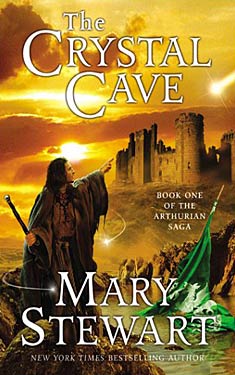Mary Stewart
Completed 11/6/2021, Reviewed 11/7/2021
4 stars
This was a beautifully written book, but I didn’t really care for it. It had amazing world-building and prose, with very detailed descriptions of places and peoples and things. However, I felt it got in the way of the story. In addition, a lot of it was court intrigue, something I’m hot or cold with. Here, I was cold. This book is considered a classic though. It won the very first Mythopoeic Award in 1971. It has a huge following. Perhaps if I had read it earlier in my life, I might have liked it more. I think I may just have read too many books by authors that were inspired by this one.
The book is about Merlin’s early life, leading up to the conception of King Arthur. Here, Merlin is presented as a bastard son of a Welsh King’s daughter. The princess never told him or anyone who the father really was, instead weaving a tale of being seduced by an incubus. And instead of marrying, her plan is to enter the convent once Merlin is an adult. His uncle despises him, since he is a potential rival to the throne. His only refuge is a hermit he meets in a cave who teaches him languages and other subjects, as well as something about his magical gift of seeing the future. When the King dies suddenly, Merlin flees but is captured by spies from Less Britain (which I think is Brittany) and take him to see their king. There he grows under King Ambrosius’ tutelage before returning to Wales.
The characterization is quite excellent. Merlin is a complex character, even at the young age in which the book begins. He does evoke a lot of pathos, as he is bullied, mistrusted, and mistreated by his family and peers. When he finally gets to Less Britain, it is a relief to see him appreciated and fostered by their King. He also gets answers to some of the questions in his own life. The one thing I didn’t care for was the lack of women in the story. There’s basically his mother and a novice at the convent. Oh, and his nurse. That’s it. They don’t have much of a role except to better understand Merlin.
The use of magic was interesting. Merlin has the ability to see the future, as well as see what’s happening elsewhere, the latter most effectively when in the Crystal Cave. He doesn’t have abracadabra type magic. However, he does gain notoriety as a prophet and a magician. The reality is a lot more pragmatic. What seems to be magic is mostly smart engineering. I found this engrossing, particularly when moving a large rock from Ireland to Stonehenge. Seeing the future however is much more unexplainable. And when it happens, it is very dramatic.
The story is based a discredited version of Merlin’s life, low in facts, but rich in storytelling. Stewart credits this account in her book. And it does make for a good story, just one that didn’t grab me much. I liked when Merlin was actually doing things and engaging with other characters. This happens more in the last third of the book, but it wasn’t enough to really hook me. I give this book four stars out of five because I recognize that this is excellent storytelling with beautiful prose. And I can see why it became an instant classic fifty years ago. It just wasn’t my cup of tea. Her second book in the series also won a Mythopoeic Award, so I will be reading that, but probably won’t read any further.

No comments:
Post a Comment